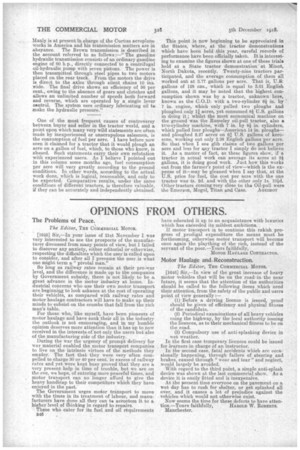OPINIONS FROM OTHERS.
Page 20

If you've noticed an error in this article please click here to report it so we can fix it.
The Problems of Peace.
7'he Editor, THE COMMERCIAL MOTOR.
[1645] Sir,—In your issue of 21st November I was very interested to see the prospects of the manufacturer discussed from ninny points of view, but I failed to discover any anxiety, either editorial or otherwise, respecting the difficulties which the user is called upon to consider, and after all I presume the user is what one might L3rm a "pivotal man."
So long as railway rates remain at their pre-war level, and the difference is made up to the companies by Government subsidy, there is not likely to be a great advance in the motor industry at home. Industrial concerns who use their own motor transport are beginniqg to look askance at the cost of operating their vehicles, as compared with railway rates and motor haulage contractors will have to make up their minds to subsist on the crumbs that fall from the rich man's table.
For those who, like myself, have been pioneers of motor haulage and have sunk their all in the industry the outlook is not encouraging, and in ray humble opinion deserves more attention than it has up to now received in the interests, of not only the users but also of the manufacturing side of the industry.
During the war the urgency of prompt delivery for war material enabled the motor transport companies to live on the intrinsic virtues of the methods they employ. The fact that they were very often compelled to charge 20 or 40 per cent, in excess of railway rates and yet were kept busy proved that they are a, very present help in time of trouble, but we are on the eve, we hope, of entering more peaceful times, and motor transport can no longer afford to give the heavy handicap to their competitors which they have enjoyed in the past.
The Government urges motor transport to move with the times in its treatment of labour, and manufacturers have done all they can to accustom it to a higher level of thinking in regard to repairs. Those who cater for its fuel and oil requirements 546 have educated it up to an acquaintance with luxuries which has exCeeded its mildest ambitions.
If motor transport is to continue this rakish progress of prodigal expenditure the means must be forthcoming, otherwise motor transport will become once again the plaything of the rich, instead of the servant of the poor.--Yours faithfully,
MOTOR HAULAGE CO-NTRACTOR.
Motor Haulage and Reconstruction.
The Editor, TEE COMMERCIAL MOTOR.
[1646] Sir,—In view of the great increase of heavy motor vehicles that will be on the road ,in the near future, it seems that the attention of the authorities should be called to the following items which need their attention, from the safety of the public and users point of view generally :— (1) Before a driving licence is issued, proof should be given of efficiency and physical fitness of the candidate.
(2) Periodical examinations of all heavy vehicles using the highway, by the local authority issuing the licences, as to their mechanical fitness to be on the road.
(3) Compulsory use of anti-splashing device in wet weather.
In the first case temporary licences could be issued for learners in charge of an instructor.
. In the second case, fatal accidents which are occasionally happening, through failure of steering and brakes, caused through "wear and tear" and neglect, would largely be avoided.
With regard to the third point, a simple anti-splash device was shown at the last commercial show. As a device it is easily fitted and is inexpensive.
At the present time everyone on the pavement on a wet day has to rush for shelter, or get splashed all over, and it causes a lot of prejudice against the vehicles which would not otherwise exist.
Now seems the time for these defects to have atten
tion.—Yours faithfully, HAROLD_ W. ROBERTS. Manchester.






















